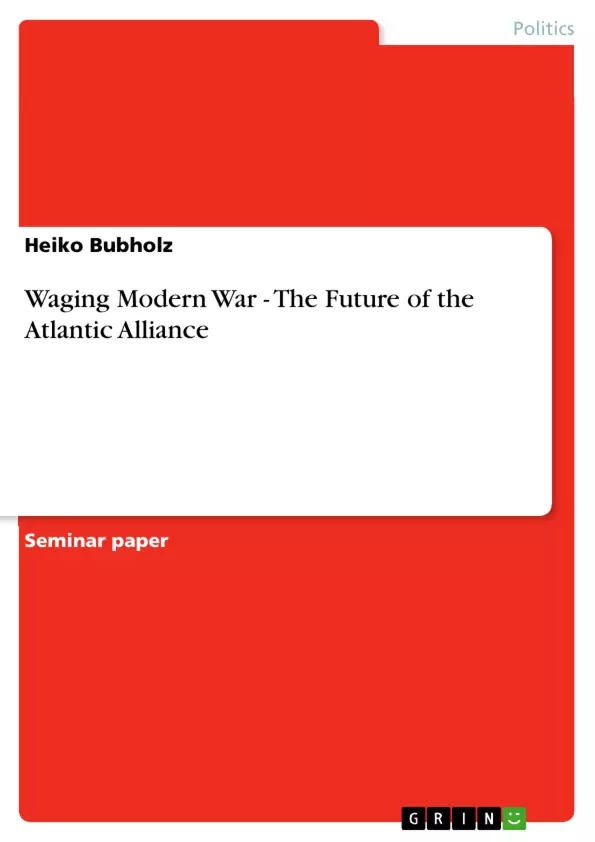Having been a soldier of the SFOR Peacekeeping Mission in Bosnia and Hercegovina I could witness and experience the role, which the United States play not only militarily in Europe. During the Kosovo campaign this engagement reached a new magnitude, probably unprecedented since the Second World War. Yet, the German Foreign Minster JOSCHKA FISCHER attested in his famous speech at the Humboldt University in Berlin that decisions of historical importance turned the faith of Europe in favor of its peoples: First, the reasoned inference of the United States and not to withdraw from the continent. And second, the courage of the main actors and former aggressors on the continent to reconcile their interests, and hence to begin a process of integration1.
The commitment of the United States in Europe supported the process of the European integration. Yet, the Europe Union proves to be a successful experiment, culminating in these days in the introduction of the €-currency. Though traditional representatives of the nation-state abandoned voluntarily some of the core characteristics of elementary sovereignty, the European Union develops on the side of the U.S. slowly towards a new dominion of world politics and power. In the field of foreign and security policy the North Atlantic Treaty Organization (NATO) provided above all the ground for common measures in and around the periphery of both actors. The so far best example in this regard is publicly considered concerning the Gulf war in 1991. Though, NATO did hardly play a significant role, the Alliance sell its engagement there as a great success2.
[...]
_____
1 Fischer (2000).
2 NATO (1998), p. 70.
Inhaltsverzeichnis (Table of Contents)
- 1. The Problem
- 2. State of Affairs
- 2.1 The European Perspective
- 2.2 The American Perspective
- 3. The Balkan Wars
- 4. Towards a European Security and Defense Policy
- 5. Modern Warfare and the Atlantic Alliance
- 6. The Bush junior Doctrine
Zielsetzung und Themenschwerpunkte (Objectives and Key Themes)
This work analyzes the changing relationship between the United States and Europe, particularly focusing on the future of the Atlantic Alliance in the context of modern warfare. It examines the evolving roles of both actors in international security, considering the emergence of a more assertive European Union and the impact of the US's unilateral actions on the transatlantic partnership.
- The evolution of the transatlantic relationship in the context of modern warfare.
- The role of the Atlantic Alliance in the face of new security challenges.
- The emergence of a more assertive European Union and its implications for the US-Europe relationship.
- The impact of the US's unilateral actions on the transatlantic partnership.
- The challenges of burden-sharing and maintaining a common security framework.
Zusammenfassung der Kapitel (Chapter Summaries)
Chapter 1 introduces the problem of the evolving transatlantic relationship, highlighting the challenges of maintaining a cohesive partnership in light of the changing global security environment. The text explores the growing assertiveness of the European Union, the US's unilateral actions, and the implications of these developments for the future of the Atlantic Alliance.
Chapter 2 delves deeper into the state of affairs, examining the perspectives of both Europe and the US on the transatlantic relationship. It highlights the sources of frustration on both sides, including European concerns about American foreign policy and US frustration with European reluctance to share the burden of security responsibilities.
Chapter 3 analyzes the role of the Atlantic Alliance in the Balkan wars, exploring the challenges and opportunities presented by these conflicts. It examines the US's dominant role in these conflicts, the European Union's emerging security capabilities, and the implications for the future of the Atlantic Alliance.
Chapter 4 explores the development of a European Security and Defense Policy, examining its progress and challenges. It investigates the motivations behind the development of this policy, its relationship with the Atlantic Alliance, and the potential impact on the transatlantic relationship.
Chapter 5 focuses on the impact of modern warfare on the Atlantic Alliance, considering the evolving nature of conflict and the challenges posed to traditional security structures. It analyzes the potential for new security frameworks, the role of technology, and the implications for the future of the Atlantic Alliance.
Schlüsselwörter (Keywords)
This work focuses on the key concepts of the transatlantic relationship, modern warfare, European integration, security and defense policy, burden-sharing, and the role of the Atlantic Alliance in the post-Cold War era. It examines the evolution of the relationship between the US and Europe in the face of new security challenges and the growing assertiveness of the European Union.
Frequently Asked Questions
What is the central focus of "Waging Modern War"?
The work analyzes the evolving relationship between the United States and Europe, specifically the future of the Atlantic Alliance in the context of modern warfare and new security challenges.
How did the Balkan wars impact the Atlantic Alliance?
The Balkan wars highlighted the US's dominant military role and the emerging need for a cohesive European Security and Defense Policy within the NATO framework.
What is the European perspective on the transatlantic partnership?
Europeans have expressed concerns about unilateral American foreign policy, while simultaneously working toward deeper integration and a more assertive European Union.
What challenges exist regarding burden-sharing in NATO?
A major source of friction is the US frustration with what it perceives as European reluctance to share the financial and military burden of international security.
What is the "Bush junior Doctrine" mentioned in the text?
The doctrine refers to the unilateral foreign policy approach of the Bush administration, which significantly impacted the traditional security framework of the Atlantic Alliance.
How does the introduction of the Euro relate to security policy?
The Euro's introduction is seen as a culmination of European integration, signaling the EU's development toward becoming a new dominion in world politics and power.
- Quote paper
- Heiko Bubholz (Author), 2002, Waging Modern War - The Future of the Atlantic Alliance, Munich, GRIN Verlag, https://www.grin.com/document/5541



